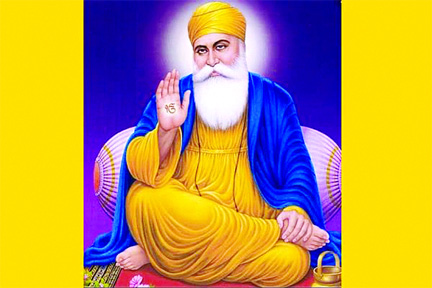
- By Jagrup Singh Sekhon
The teachings of Guru Nanak Dev Ji and his philosophy of universalism are more relevant in contemporary times when humanity is passing through all shades of serious conflicts. The 554th birth anniversary of Sikhism’s founder has proved to be a watershed in the history of Indo-Pakistan ties in an era of bitterness and animosity.
The decision to open the Kartarpur Corridor and the visa-free access to followers of his philosophy to the shrine at Kartarpur in Pakistan’s Narowal district—less than 4 km from Dera Baba Nanak, another revered place of Sikhs in Indian Punjab—is a testimony to Baba Nanak’s teachings of love, brotherhood and universalism. The Sikhs recite this prayer two times in a day, Jinha Gurdhama Tou Panth Nu Vichhodaya Gya Hi, Ohna De Sewa Sambhal Da Daan Pyare Khalsa Ji Nun Baksho (Dear God, bless the Sikh community to have uninterrupted access to religious places left behind in Pakistan as a result of division of the subcontinent in 1947).
The teachings of Guru Nanak Dev show us the path of establishing a just social order. The social order of his time was based on inequality and injustice. He not only condemned but challenged that order in which the dominant forces of all shades were exploiting the marginalised sections. In this way, the ideology of Baba Nanak was deadly against the unjust order of the then Mughal ruler Babur. Baba Nanak condemned the caste structure and showed a path to his followers to rise above caste. His closest disciples Bhai Mardana and Bhai Bala belonged to lower castes.
The dignity of women has a special place in the teaching of Guru Nanak. He not only talked about the equality of man and woman but gave special space to the woman as a creator. Women were considered very low in the social hierarchy and treated as men’s property. In these conditions Guru Nanak gave a very revolutionary idea by preaching equality of women with men. The dignity of women has been underlined in the following verses of Guru Nanak:
Bhand jamiye bhand nimmiye, bhand mangan veaho / Bhando hovey dosti, bhando challe raho / Bhand mua bhand bhaliye, bhand hove bandhaan / So kyon mandaaakhieay jit jamme raajan Bhando hi bhand upje / Bhande baajh na koay / Nanak bhande bahra, eko sacha soay (From woman, man is born; Within woman, man is conceived; to women he is engaged and married. Woman becomes his friend; Through woman, the future generations come. When his woman dies, he seeks another woman; to woman he is bound. So why call her bad? From her, kings are born. From woman, woman is born; without woman, there would be no one at all. (Guru Nanak, Raag Aasaa Mehal 1, Page 473).
The uniqueness of his deep philosophical insights gave birth to the concept of the word ‘secularism’. He was among the first who paid homage to the ideal of Na ko Hindu, na Musalman (there is no Hindu: there is no Musalman) and all are the creation of the Almighty. His conviction is that the entire universe is suffused with divine light. Leading an exemplary life, Guru Nanak presented a new vision of life to end dissension among people. His ideology was so simple, so compassionate and so practical that the disenchanted people found in him a Messiah who gave a new purpose to their lives.
The philosophy of Baba Nanak, from the very beginning, devised an in-built system for the cooperative provision of free food (langar), accommodation and security for the needy. Before his death at Kartarpur, the Guru selected his successor from his followers and by the time he breathed his last the nucleus of a new social group had come into existence with an acknowledged Guru to guide its social and religious life. He built a community at his last place as a model of an egalitarian and sustainable society based on three principles— sangat, pangat and langar (congregation, sitting in row, free kitchen). This was to give practical shape to his teaching of oneness of mankind,to eliminate social distinctions and promote community ownership.
Giving dignity to labour was one of the other important contributions of Guru Nanak’s philosophy as he said that “they alone who live by the fruits of their own labour and share its fruits with others have found the right faith”. It was a death blow to the then caste structure, social hierarchy and untouchability. This ideology laid emphasis on self-reliance achieved through hard work, which would be the source of one’s identity and self-respect. Primacy was given to building an equitable society where the deprived, the oppressed and the women could experience a new meaning to their existence
It is in this context that the teaching of Guru Nanak has great relevance in contemporary times. His vision of environment i.e. Pawan Guru, Pani Pita, Mata Dharat Mahhat (Air is our guru, water our father and land our mother) about 500 years ago is a testimony to his vision of human existence and the challenges to it in times to come. He left his legacy to all of mankind; unfortunately it has not been sufficiently followed by the community that claims to be the inheritors of his teachings. The recent tussle between various Sikh groups while celebrating his birth anniversary shows that the community has yet to adhere to his ideals of brotherhood, castelessness and egalitarianism.
(The author is Professor of Political Science at the Guru Nanak Dev University, Amritsar)
Source: The New Indian Express
Guru Nanak’s vision and philosophy
Building an Egalitarian Society
Even though India is an aspiring superpower, it’s caste hierarchy is still engraved in the societal order.
– Guru Nanak Dev’s vision of a casteless society in which there is no caste hierarchy can help to establish an egalitarian society.
– His idea of equality can be deduced by the following innovative social institutions, as given by him:
Langar
Collective cooking and sharing of food.
Pangat
Partaking food without distinctions of high and low caste.
Sangat
Collective decision making.
– These egalitarian practices had directly challenged the untouchability and the caste system and continue to do so.
Social Harmony
Increased cases of intolerance, mob lynching and right-wing vigilantism, affects the secular nature and social harmony of the Indian society.
– Guru Nanak Dev’s concept of “Jeeye kaa ik daata” can address these issues.
– According to him, the whole world is God’s creation (Jeeye kaa ik daata) and all are born equal. There is only one universal creator i.e. “Ik Omkaar Satnaam.”
– This spirit of equality began with Guru Nanak Dev’s clear recognition that there is no distinction between a Hindu and Muslim. For him, no country was foreign and no people were alien.
– This philosophy is similar to the Sanskrit saying “Vasudhaiva Kutumbakam” that describes the whole world as one family.
– Apart from it, forgiveness, patience, forbearance, and kindness are the core of Guru Nanak Dev’s teachings.
Creating a Just Society
Inequality is the root cause of all social evils.
– Guru Nanak Dev placed the motto of “kirat karo, naam japo and vand chhako” (work, worship and share) before his disciples.
– He stood for karma as the basis of dharma, and he transformed the idea of spiritualism into the ideology of social responsibility and social change.
– He suggested that we earn by honest labour and share the earnings with the needy.
– He advocated the concept of “dasvandh” or donating one-tenth of one’s earning among needy persons.
– The selfless service to mankind known as “Seva” is central to the teaching of Sikhism.
– These ideals can help us in establishing a just society today.
Gender Equality
Women have been the most oppressed sections of the society.
– Guru Nanak Dev argued that “How can women be inferior when they give birth to men?”
– According to him, “Women as well as men share the grace of God and are equally responsible for their actions to him.”
– Respect for women and gender equality is perhaps the most important lesson to be learnt from Guru Nanak Dev’s life.
According to Indian Philosophy, a Guru is the one who provides illumination, dispels doubt and shows the right path. In this context, the ideas of Guru Nanak Dev can help promote peace, equality and prosperity across the globe.
Every person can learn a lot from the teachings of Guru Nanak Dev. Leaders of the world can also learn from his life and teachings so that meaningful dialogues between various communities can be initiated (especially in the conflict-ridden parts of the world). This will certainly propagate the ideas of peace, stability and cooperation, and make the world a better place to live in.





Be the first to comment